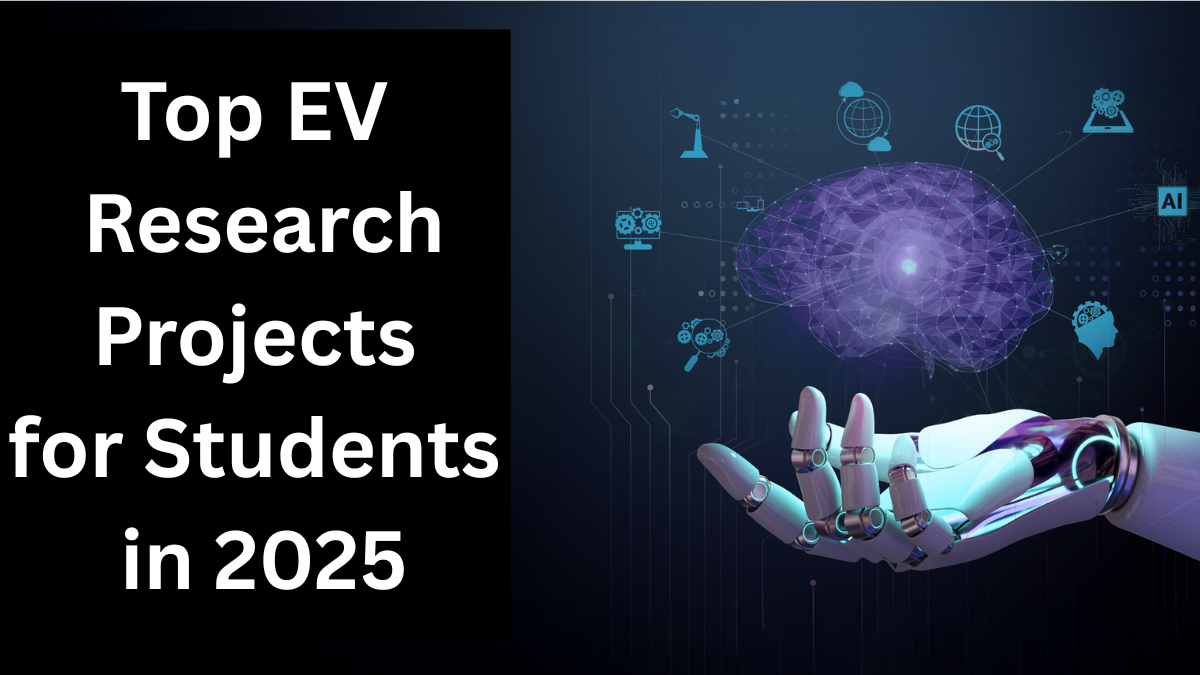If you’re a university student passionate about electric mobility and sustainability, 2025 is the year to charge ahead with impactful ideas. The automotive world is undergoing a rapid transformation, and students are at the heart of this electric revolution. Whether you’re pursuing mechanical, electrical, or automotive engineering, these EV research projects offer the perfect launchpad for your university project and can even be your stepping stone into real-world auto innovation.

Why Choose EV Research in 2025?
Electric vehicle research is more than just a trending topic—it’s a global necessity. With governments pushing for greener alternatives and industries investing in cutting-edge tech, students now have the opportunity to contribute to tomorrow’s sustainable transport.
Benefits include:
-
Hands-on experience with real-world challenges
-
Strong portfolio addition for internships and jobs
-
Contribution to clean, green innovations
-
Collaboration with industry partners and institutions
Top Electric Vehicle Research Projects for Students
Here’s a curated list of exciting and relevant research project ideas for 2025:
| Project Title | Focus Area | Why It Matters |
|---|---|---|
| Battery Thermal Management | Cooling systems | Prevents overheating & improves battery life |
| Regenerative Braking Systems | Energy recovery | Enhances energy efficiency during braking |
| Smart EV Charging Stations | IoT & AI | Builds sustainable, fast-charging networks |
| Lightweight EV Chassis Design | Materials engineering | Boosts EV range and performance |
| Wireless Charging for EVs | Magnetic field tech | Brings convenience and future readiness |
| Solar-Powered EVs | Renewable energy integration | Offers self-sufficient travel for EVs |
| EV Fault Diagnosis Using AI | Predictive maintenance | Reduces downtime and improves safety |
| Swappable Battery Systems | Battery design | Reduces charging time & increases range flexibility |
| Autonomous Driving in EVs | AI & ML | Integrates future transport technologies |
| Recycling and Reuse of EV Batteries | Sustainability | Promotes circular economy & waste reduction |
Tips for Choosing the Right Project
Selecting the best electric vehicle research topic for your university project can be overwhelming. Here’s how to narrow it down:
-
Match with your interest: Do you enjoy electronics, coding, mechanics, or AI?
-
Check feasibility: Consider lab access, faculty support, and cost.
-
Look at real-world relevance: Choose projects linked to current industry needs or policies.
-
Explore innovation potential: Try ideas that offer scope for publication or patents.
Collaborate with Institutions & Startups
Many startups and government-backed EV labs are open to student collaborations in 2025. Get in touch with:
-
Local auto innovation hubs
-
Research grants offered by your university
-
Hackathons and sustainability challenges
-
EV manufacturers running student competitions
FAQs
Q1. Can undergraduate students work on Electric Vehicle research projects?
Yes! Many undergraduate students across India and globally are actively working on EV-related university projects. It’s encouraged as it builds practical skills and research experience.
Q2. Which is the easiest EV project for beginners?
Projects like “Regenerative Braking Systems” or “Battery Health Monitoring” are ideal for beginners as they’re easy to prototype with available lab equipment.
Q3. Are these projects only for engineering students?
Not at all! Students from computer science, data science, and even business streams can participate in electric vehicle research, especially in software, user behavior, or sustainability impact studies.
Q4. How can I get funding or mentorship for my EV research project?
Check with your university’s research cell, apply for government innovation grants, or reach out to EV startups that often welcome student involvement for auto innovation.
Final Thoughts
2025 presents an incredible opportunity for students to lead from the front in electric mobility. With the right electric vehicle research project, your next university project could contribute to the next wave of auto innovation shaping the global future.
So go ahead, plug in your ideas, and spark a sustainable change!
Click here to learn more